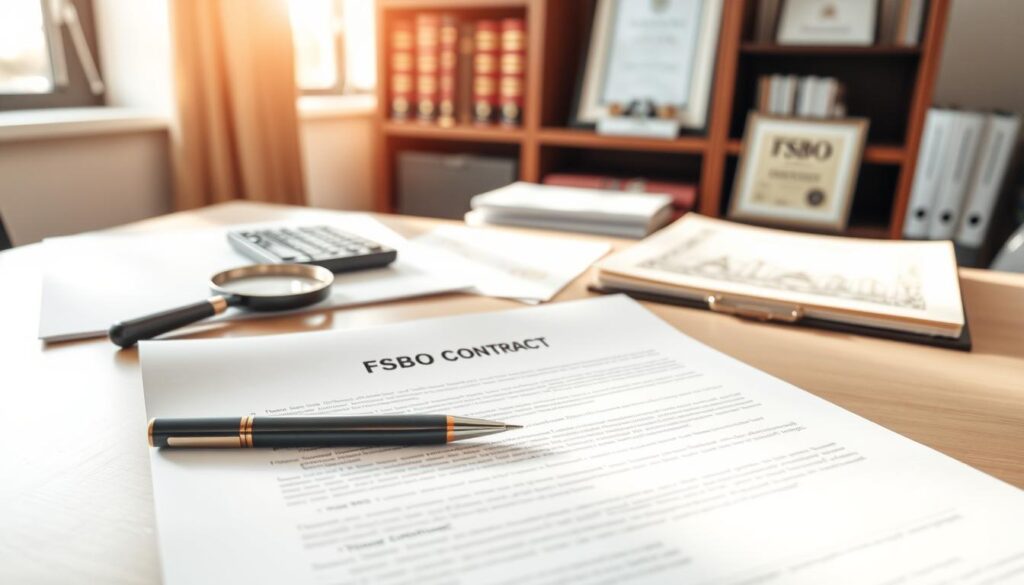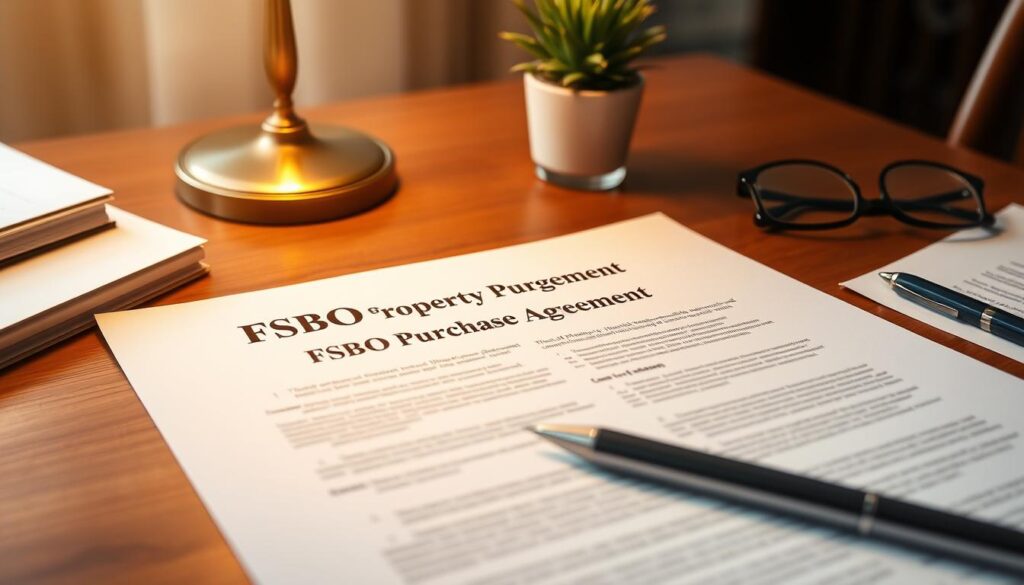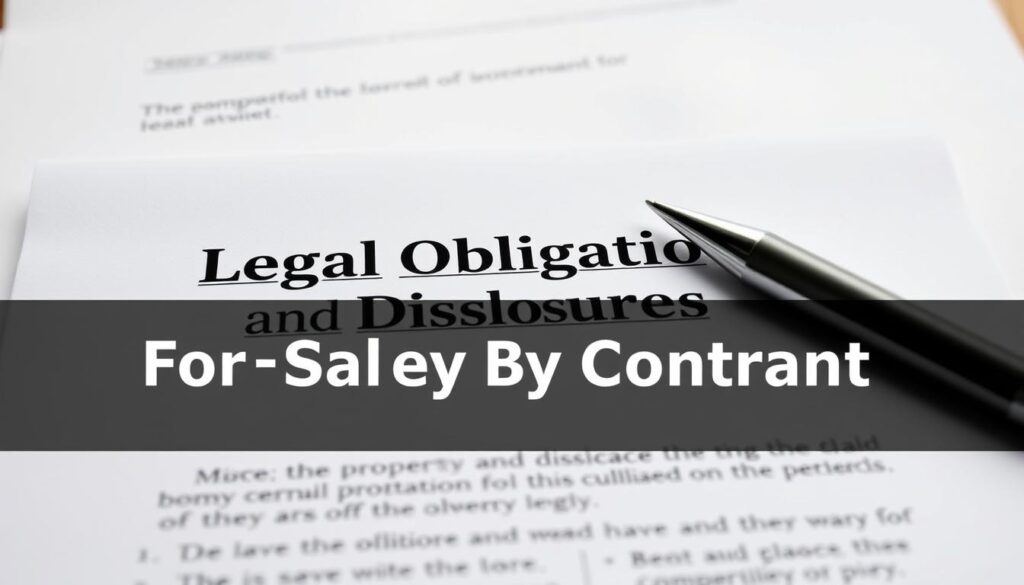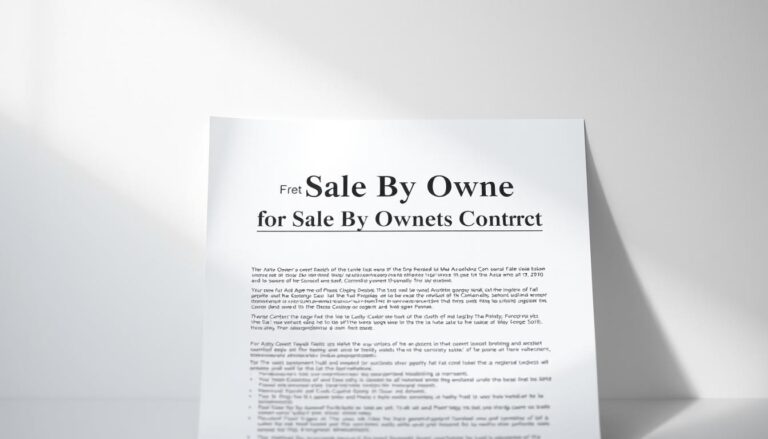For Sale By Owner Contract is an essential part of selling your home without a real estate agent. Navigating the process can feel like uncharted waters, and drafting a legal property agreement might seem overwhelming. However, with the right knowledge, you can confidently take control of your home sale.
A For Sale By Owner (FSBO) contract is more than just paperwork. It’s your roadmap to a successful property transaction. With about 8% of home sales in the U.S. done without an agent, more homeowners are saving on commission fees.
Understanding a legal property agreement is key. While 10% of sellers find drafting contracts challenging, you can overcome this. By arming yourself with the right information and resources, you can succeed.
Table of Contents
Understanding FSBO Contracts and Their Legal Framework
For Sale By Owner (FSBO) deals need a good grasp of legal agreements and property contracts. With 10% of sellers finding it hard to draft contracts, it’s key to be well-prepared and knowledgeable.

A solid legal agreement sets clear expectations for both buyers and sellers. It’s a crucial document that outlines the sales process. This helps avoid disputes and legal issues.
Types of Legal Property Agreements
Real estate deals involve different legal agreements:
- Purchase agreements
- Option contracts
- Lease-to-own agreements
- Warranty deed transfers
“A well-crafted FSBO agreement can save you thousands in commission fees and provide complete control over your property sale.” – Real Estate Expert
Basic Contract Requirements
Every valid fsbo agreement must have key elements:
- Clear offer and acceptance terms
- Specified consideration (purchase price)
- Legal capacity of parties
- Mutual consent
State-Specific Regulations
Florida and other states have their own rules for property agreements. Real estate attorney fees can be $150 to $500 per hour. It’s vital to know local laws. Your contract must follow state disclosure rules and transaction guidelines.
Keeping your interests safe means creating a detailed, legally sound FSBO agreement. It should address risks and ensure a smooth property transfer.
Essential Components of a For Sale By Owner Contract

Creating a detailed homeowner sale contract is crucial. It must protect both the buyer and seller. Knowing the key parts helps you handle the real estate process well.
Important parts of a strong FSBO contract are:
- Purchase Price and Payment Terms
- Property Description
- Closing Date and Possession Timeline
- Financial Details
- Contingency Provisions
When making your contract, focus on important clauses. The purchase price must be clear, with details on how to pay. You should also state the earnest money deposit, usually 1% to 3% of the property’s value.
Legal rules differ by state, but some things are always needed. For example, homes built before 1978 need a Lead Hazard Disclosure Statement. Your contract should also include:
- Detailed property condition disclosure
- Title transfer information
- Default provisions
- Inspection contingency clauses
Contingency clauses are very important. They let both sides cancel the contract if certain things don’t happen. These can include home inspections, financing, and appraisals.
A well-crafted FSBO contract is your best defense against potential legal complications.
Getting a lawyer to review your contract is wise. It ensures your contract follows all laws, saving you time and money.
Drafting Your Property Purchase Agreement
Creating a private home sale contract needs careful planning and detail. As an unrepresented seller, you must make a detailed agreement. This agreement should protect your interests and meet legal standards.

Your property purchase agreement is key for a successful sale. Knowing the important parts helps you sell your home without an agent.
Required Documentation for Your Contract
- Property details including exact address and legal description
- Agreed purchase price
- Names and contact information of both buyer and seller
- Detailed disclosure statements
- Specific terms of sale
Best Practices for Contract Writing
When writing an unrepresented seller contract, clarity is crucial. Use simple language to avoid confusion. Include specific details about:
- Closing dates
- Financing terms
- Property condition
- Repair responsibilities
Common Mistakes to Avoid
Many sellers make mistakes when creating a private home sale contract. To protect yourself, avoid:
- Vague language
- Missing contingencies
- Not checking state laws
- Not making full property disclosures
Tip: Consider consulting a real estate attorney to review your final draft and ensure complete legal compliance.
Purchase agreements are legally binding once signed. Spending time on a detailed, clear contract helps avoid disputes. It also protects your interests during the sales process.
Legal Obligations and Disclosures

When you sell your home directly, knowing your legal duties is key. In about 45% of states, sellers must share certain property facts. This makes being open and honest very important in a legal agreement.
There are several important things you must disclose:
- Any structural problems you know about
- Environmental dangers like lead paint or asbestos
- Any ongoing legal issues with the property
- Any maintenance problems you’re aware of
If you don’t share this information, you might face legal problems in about 25% of cases. It’s crucial to give all the details to protect yourself and the buyer.
Here are some key things you need to disclose:
- A detailed report on the property’s condition
- Information about lead-based paint for homes built before 1978
- Any property tax issues past or present
- Details about who owned the property before you
Talking to a lawyer can make selling your home easier. Studies show that 90% of sellers who get legal advice have smoother sales. Being clear and detailed in your contract helps avoid legal issues later on.
Transparency is the foundation of a successful real estate transaction.
Protecting Your Interests with Contract Contingencies
When you sell your home without a realtor, knowing about contract contingencies is key. These clauses protect both sides by allowing them to back out under certain conditions.

Contingencies are vital in real estate deals. They help manage risks and offer clear ways out if problems pop up during the sale.
Inspection Contingencies
Inspection contingencies let buyers check the property’s condition. Important points include:
- Professional home inspection within 7-10 days of contract acceptance
- Right to request repairs or negotiate price based on inspection findings
- Option to withdraw from the contract if significant issues are discovered
Financing Contingencies
Financing contingencies help buyers who need a mortgage. Almost all states require this, letting buyers cancel without penalties if financing falls through.
“A well-crafted financing contingency can save both parties from potential legal and financial complications.”
Title Contingencies
Title contingencies check if the property can be legally sold. They ensure:
- Clear property ownership
- No outstanding liens
- Ability to transfer a clean title
When making an independent home sale contract, finding the right balance is crucial. Too many contingencies might make your offer less appealing, especially in competitive markets.
Contract Terms and Financial Considerations
Creating a for sale by owner contract needs a good grasp of financial aspects. Your FSBO agreement must clearly outline the financial structure of the property sale. This includes payment methods and financial responsibilities.
Key financial considerations in an FSBO agreement include:
- Purchase price determination
- Payment method selection
- Earnest money deposit requirements
- Financing options
In Florida, the median home price is $407,000. Buyers have several financing choices for their FSBO agreement:
- Cash purchases
- Conventional mortgages
- FHA loans
- Owner financing
“A well-structured FSBO contract protects both buyer and seller by clearly defining financial expectations.”
Your contract should specify critical financial details such as:
- Down payment amount
- Loan type and terms
- Closing cost allocation
- Property tax responsibilities
For owner financing, include specific loan parameters like interest rate, payment schedule, and prepayment conditions. The financing contingency clause is key. It lets buyers exit the contract if they can’t secure funding under specified terms.
Getting a professional legal review of your for sale by owner contract is wise. It can help spot financial risks and ensure a smooth transaction.
Role of Professional Assistance in FSBO Transactions
Selling your home by owner needs smart professional help. This is because of the complex legal and financial areas. Even though 31% of FSBO sellers want to skip commission fees, experts can help protect you and lower risks.
Professional services are key for a smooth sale process. They help even those selling on their own avoid big mistakes.
Legal Review Options
Your FSBO deal needs careful legal checks. Here are some professional review options:
- Real Estate Attorney: Full contract review
- Transactional Agent: Help for the transaction
- Buyer’s Agent: Support in negotiations
Legal review costs can be $800 to $1,200 for contract prep. Hourly rates are $150 to $350.
Title Company Services
Title companies offer vital services for FSBO deals. They include:
- Doing detailed title searches
- Offering title insurance
- Helping with ownership transfer
Escrow Management
Escrow services are crucial for FSBO deals. They make sure all deal conditions are met before property and money are exchanged. This step protects both sides during the sale process.
Professional help can guide FSBO sellers through complex real estate deals with confidence and legal safety.
Negotiation and Modification Procedures
Negotiating a property agreement needs smart thinking and clear talk. You can change your owner-seller contract, but every tweak must be written down and agreed by both sides.
Here are some key strategies for negotiating your property agreement:
- Keep your communication professional and fair
- Have all your documents ready
- Know how flexible your contract can be
- Focus on the most important parts of the contract
About 40% of real estate deals have conditions tied to loan approval. If you need to make changes, follow these steps:
- Write down all changes
- Get both parties to sign
- Make formal addendums to the original contract
- Make sure you follow state laws
Using digital tools can make negotiations easier. Platforms like DocuSign can cut drafting time by half. This makes changing contracts quicker and clearer.
Remember: Every change must look out for both the buyer’s and seller’s interests in the contract.
Today’s digital tools speed up and secure contract talks. With legal digital signatures, you can safely update your property agreement while keeping it legal.
Conclusion
Creating a legal property agreement through a For Sale By Owner (FSBO) contract can be tough. About 10% of sellers struggle to write their own contracts. It’s key to understand the complexities well.
Your success in selling your property on your own depends on careful preparation. You need a detailed plan for selling independently. This approach is crucial for a smooth transaction.
Getting professional help, like a real estate attorney, is a good idea. They can review your contract for $150 to $500 per hour. This can prevent legal issues and ensure your contract is correct.
Negotiation skills and knowing about contracts are very important. Selling your home yourself can save money but takes a lot of time and knowledge. Many find it harder than expected, especially with drafting and negotiating contracts.
Your main goal is to sell your property successfully and legally. By preparing well, knowing local laws, and maybe getting professional advice, you can do it confidently. Stay informed, be patient, and focus on each step with care and detail.

